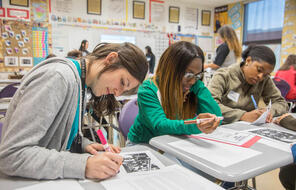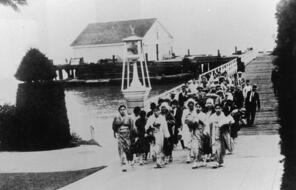131 Results
Global Migration & Immigration
Current Events in the Classroom
Explore classroom resources for making connections between current events and your curriculum, including activities and discussion strategies for high school and middle school students.

Resources for Civic Education in California
Explore resources that meet the California History–Social Science Framework standards.

Resources for Civic Education in Massachusetts
Explore resources that meet the Massachusetts History and Social Science Framework.

Developing Student Agency through History and Literature: Middle School Curriculum
Lead middle school students in an 18-week study of identity, membership and belonging, and civic participation through analysis of historical case studies and literature.

Discussing Contemporary Islamophobia in the Classroom
This unit is designed to help students in the UK reflect on how Islamophobia manifests in contemporary society and what needs to be done to challenge it.

Media and Strategies for Teaching Enrique’s Journey
Find all of the digital resources you need to use the Teaching Enrique's Journey guide.

Angel Island Immigration Station: Exploring Borders and Belonging in US History
This 5-7 day C3-aligned inquiry explores the compelling question “How does the history of the Angel Island Immigration Station help us understand how borders are erected, enforced, and challenged?”

Using Survivor Testimony in the Classroom, in Partnership with Generation 2 Generation
On-Demand
Virtual
Support your students’ intellectual and emotional engagement with survivor testimony in the classroom.

Challenging Racial and Religious Hatred in the Classroom
A look at recent teacher training sessions to support teachers in discussing racial and religious hatred in the classroom.

New Teaching Resources for They Called Us Enemy and Author Event with George Takei
Participating in our All Community Read? Our recommended resources can support you and your school as you learn about Japanese American incarceration.

Why Just Mercy Matters
The film Just Mercy can offer invaluable insights to students in unpacking the harsh realities of the justice systems.


